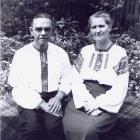1
Andrew Gregorovich tells about his father, Alexander Gregorovich, who immigrated to Canada in 1911.My father was born on March 11, 1893 in Orelets, Ivano-Frankivsk region of Ukraine. It was in the Austro-Hungarian Empire then. The family had a small farm in Orelets. He was encouraged to immigrate to Canada by his mother, who said that his older sister who was already living in Canada, would be lonely without him. He arrived in Canada in 1911. He landed in Quebec and he took a train all the way to Alberta. When he arrived, he had only five dollars in his pocket. There was a rule to have a certain amount of money in your pocket in order to get into Canada. My father says that they would help later immigrant arrivals by sneaking back and lending them the money so they could get through the immigration process. So my father helped others to land in Canada.
The first job that he ever had was on the railway. He helped to build railways across Canada. In a year he enrolled at the University of Alberta to study to be a doctor. Unfortunately, his finances were not sufficient to keep him, so he just finished one year in the University of Alberta. At that time the Canadian Government provided no assistance for Ukrainian immigrants who were called Galicians or Austrians. My father earned money by working on the railways and went to the English School for Foreigners and Teacher's College. The English School for Foreigners taught Ukrainians the English language. My father graduated and became apparently one of the first teachers of Ukrainian origin. He got his certificate in 1915 and became an official teacher of the province of Alberta. Alberta then was a very young province, founded in 1905.
When my father became a teacher, he decided to teach in rural schools in Alberta. He taught in about 15-20 schools over a period of about 20 years. Many of those schools had Ukrainian names, like Myroslavna or Kolomyia so he was right at home at those schools. The teachers in provincial schools were not allowed to use Ukrainian. In some schools both teachers and students were punished for using Ukrainian. My father never punished his students for using Ukrainian. In fact, he worked on making students of Ukrainian origin proud of their heritage. Later the Ukrainians established what was called "Ridna Shkola", Ukrainian Language schools.
My father started to teach in 1915 in Mud Creek School. He taught many generations of Ukrainian Canadians. The schools that he was teaching in were north east of Edmonton. There was over 2000 square miles of Ukrainian settlements in that area of Alberta. The schools that he taught in were virtually all Ukrainian. All the schools that he taught in were one-room-schools, and he had students from grade one to grade eight. He inspired quite a number of young Ukrainian Canadians to become very active in the Ukrainian Community. He told me that his teacher in Ukraine made him memorize tens poems of Taras Shevchenko as a punishment for misbehaving at school. He became very fluent not only in Ukrainian, but in the poetry of Shevchenko. Later, of course, my father appreciated that "punishment".
He lived in what was called a teacher's shack, a very small one-room house, not far from the school. He had no farm animals there. In the 1920s he encountered financial problem because the schools were supported by the local population, and because of the depression. The people had no money, so he was not paid salary, but he would get some eggs or other foodstuffs, as a result of being the teacher in the locality.
He became very active in the Ukrainian community helping to found the Ukrainian National Federation and served as the first national president. Before that he had taken Ukrainian-dancing lessons from Vasyl Avramenko, who was a very important figure in the cultural history of Canada and the United States. He met my mother on those lessons and married her. Also, he was one of the founders of the first Ukrainian Credit Union in Canada that was established in Saskatoon by UNO (Ukrainian National Federation).
My father corresponded with then President of Ukraine (1918) Mykhaylo Hrushevsky, the professor of history. My father was his agent, selling Hrushevsky's books in Canada. Some letters still exist. He had a very beautiful handwriting.
My father was very soft. He didn't speak very patriotic about Ukraine or lectured us on Ukrainian history. However, we, children, became involved into Ukrainian activities by his own example, not by his instructions or urging us, or pushing us into Ukrainian heritage. We learned the language and the traditions, and became interested in Ukrainian history by ourselves. He didn't push the history on us at any time. But we knew that he had been very active; that was very obvious. Most of his life he also translated. He translated a number of Ukrainian books into English. He collected a group of Ukrainian Academy of Science Dictionaries and made a microfilm of them. The microfilm was sent to major Universities of the world to preserve the Ukrainian language of that time.
My father made a major contribution to Canada. In fact, for the 100th anniversary of Ukrainians in Canada in 1991 he was chosen as one of the 100 most significant Ukrainian Canadians. This happened already after his death (he died in 1970).
3
Alexander Gregorovich and Mary Pawluk Gregorovich1967
Hamilton, Ontario, Canada
 Credits:
Credits:Andrew Gregorovich
